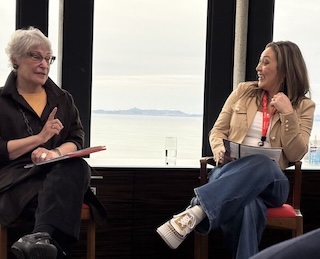

As students resume their college and career journeys following the COVID-19 shutdown, they face challenges that affect their overall mental health and wellbeing—and the impact is far greater for first-generation students from under-resourced communities. In the aftermath of the pandemic, students find themselves still feeling socially isolated as the shift from virtual to in-person learning happens under their feet. In a recent report from Gallup, “emotional stress” remains by far the most commonly cited reason for students thinking of ending their higher education journey.
Being the first in your family to attend college can feel like a series of insurmountable challenges when you don’t have a support network that has gone to college and can provide guidance about the process. Learning to navigate a complex educational institution now presents new challenges, as the social space after pandemic isolation can be intimidating and unfamiliar. Our experienced and inspirational coaches have been in our students’ shoes, and they know what it’s like to navigate the path through college. Our coaches have the experience and training to support students through their pandemic-impacted college experience. Coaches not only support our students with challenges familiar to them and their own journey, but also with the unique challenges our students face in the aftermath of COVID-19.
Working closely with students this year, Beyond 12 coaches have found that students are exhausted, with mental health challenges persisting, in part because they continue to feel socially isolated without the networks or opportunities to build community.
Our students, like others around the country, spent a considerable amount of time in a virtual learning environment during the COVID-19 shutdown —some of them even had a virtual high school graduation, and they grew accustomed to the majority of their school-related social interactions being completely online.
Moving from a virtual environment to a hybrid or in-person space during an already complicated transition to college can be extremely intimidating and isolating; this is amplified for students who are the first in their family to attend college. This is where Beyond 12 coaches play a key role in helping students feel less alone.
Applying to college and receiving an acceptance letter is just step one—without the proper network and support to overcome these external challenges, students can struggle to navigate and graduate from college. The feelings of loss and grief caused by the COVID-19 pandemic led to an overall rise in students’ mental health challenges, as they struggled with unprecedented circumstances during a pivotal moment in their lives. Studies show that students from under-resourced communities are facing even greater mental health challenges. According to data collected by the National Association of Student Personnel Administrators, “40.3% of first-generation students [in the study] experienced clinically significant symptoms of major depressive disorder (MDD) and 44.6% experienced clinically significant symptoms of generalized anxiety disorder (GAD)—figures higher than national averages”. When students are faced with external stressors that affect their mental health, their overall academic performance is hindered. A 2020 study from Healthy Minds Network found that students who struggle with mental health issues are twice as likely to leave college without a degree.
Students coming into college with the social capital and knowledge of how to navigate the education system are at an advantage in building the relationships that impact their success and ability to take opportunities to advance their careers. First-generation students may not know where to ask for help, feeling lost in the sea of students going to the same university. In these circumstances, having a coach who experienced these same issues when they were recently in college can be monumental for validating their experience. “Some people just want to be heard, and being able to relate is an asset in the population we work with,” Beyond 12 Coach DeSiyre Spurgeon stated. “First-gen students who I coach go on campus and don’t necessarily connect with people they see who are like them.” Students are able to connect with their coaches and ask about their own similar experiences from their transition to a higher education institution.
Unforeseen financial obstacles also contribute to the isolation students are experiencing. Campus social events charge fees not covered by financial aid or scholarships, forcing students to choose how to allocate their limited budgets. Consequently, these added financial barriers prevent them from enjoying the full, in-person college experience advertised leading to a continued feeling of isolation.
With multiple systemic barriers keeping students isolated from experiences that help them grow to build a proper support system, what is valuable to them is someone with similar past experiences who can listen and provide direct solutions and guidance on accessing campus resources.
Personal stories matter, and Beyond 12 coaches share their own stories with students almost every day. Coaches are able to relate to their experience, and they help them feel seen, heard, and a little more comfortable asking for help. They offer themselves as a resource in their growing network in addition to what is already available on their campuses, and they help connect their students to those resources if they aren’t already aware of them.
College Coach Jasper Jones shared that connecting one’s personal stories with the students helps them feel safe and they know they are not alone in their journey.
“I share my story in a hope to normalize their feelings and experiences,” they said. “As someone who has been through a lot of hardships in college and is successful now, I tell them I’ve been through similar experiences. Some students actively seek that validation and at other times I ask if it is okay to share my personal experiences.”
Coaches are also able to provide the socio-emotional support they may have found helpful during their own college journey. The near-peer coaching model allows flexibility in providing students with what they need at the moment and letting students drive the agenda. “A lot of times my students explicitly ask for resources,” Coach Bria Shackleford said, “and other times they say, ‘hey coach, I don’t need you to speak or say sorry, just let me vent.’”
Beyond 12’s coaching platform was built for a virtual environment. Actively listening to students’ needs– what is said and unsaid– is key, and the platform facilitates this connection in a way that is tailored to the students’ schedules and individual needs.
“Supporting and listening is so important because we can’t physically give a hug to our students dealing with a lot,” Bria said. “It has to be a virtual hug and verbally sympathizing, empathizing, or even just saying ‘I'm sorry’. The support is still there.”
In order for students to thrive in an education system with barriers that impede their path to success, the institutions they attend must be student-powered. Institutions that are student powered center their students, elevate their voices, and use student-generated insights to drive systemic change. When students feel confident and supported they can effect change so that higher education works for all students. Our proven, personalized coaching approach to coaching meets students where they are, guides them through every day challenges, and promotes their power and agency.
Beyond 12 partners with institutions across the country to increase college retention and improve student outcomes through empathetic coaching. We can all play a part in redesigning the education system to truly close the college graduation gap and allow ALL students to flourish. If your institution is ready to make coaching a part of your support for students, Beyond 12 is here to be your partner.

Like many of you, my head and heart are heavy with the weight of this moment.
Read More
Some moments in leadership are more than announcements—they are homecomings.
Read More
My journey as a social entrepreneur began at Stanford University. As a graduate student,
Read More